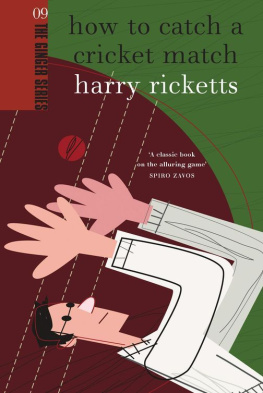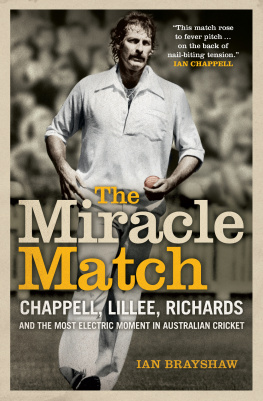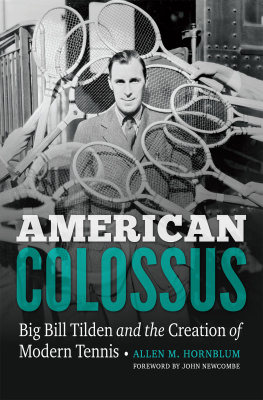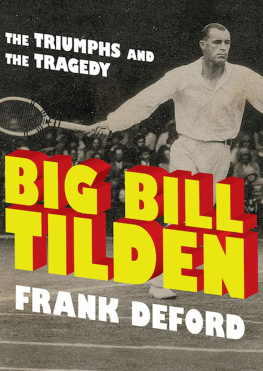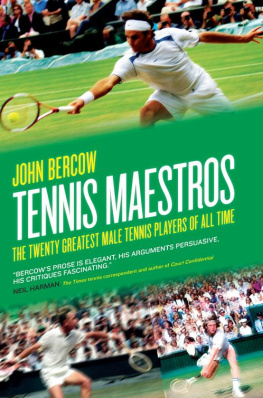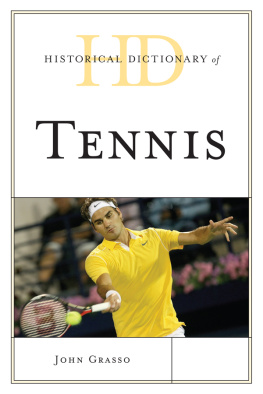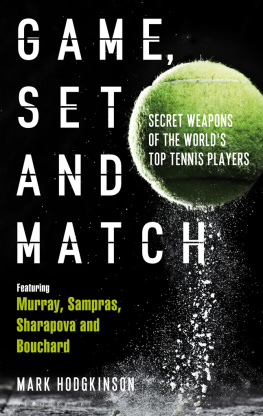MATCH PLAY
and the
SPIN OF THE BALL
by
WILLIAM T. TILDEN, 2ND

INTRODUCTION
THERE is no sensation in the sporting world so thoroughly enjoyable to me as that when I meet a tennis ball just right in the very middle of my racquet and smack it, just right, where my opponent should be but is not. I enjoy the ring of the baseball off my bat (if I ever manage to hit one), the thrill that comes as the golf ball sails down the course from my driver (it usually sails out into the rough or else ten feet down the course), the thud of the football as it goes (possibly 15 yards) off my toe, the ice under my skates (or my back, more often); but none of these afford me the same mad thrill of crazy excitement as grips me when I smack a tennis ball, just right.
Just because I am a tennis bug. One of those poor nuts that will sit out, until eight oclock at night, together with other tennis bugs like Craig Biddle and Wallis Merrihew, to watch a couple of kids, or old men, or dubs, finish a match that means nothing. I am writing this book in the hope that somewhere in the world is another tennis bug who will have as much fun reading it as I have had writing it.
This book is for the tennis bug, because it is primarily advanced tennis. Anyone can go out to a professional and be taught strokes. They may be good or they may be bad (the strokes I mean), according to the professional. My experience tells me that in nine cases out of ten they will be bad. Professionals are for beginners, novices, the Great Dubto relieve him of his unwelcome burden of that title.
Only an amateur who has been through the mill of championship, competitive tennis, can tell the inside story of tennis, its fine points, its science and its art. It is something of the inside story of match play, from the technical angle, that I am writing.
BILL
BY GERALD L. PATTERSON
TO Bill Tilden full credit is due for the wonderful progress of the game of lawn tennis in these last five years. His keen, analytical brain has made possible a higher standard in tennis, his writing has given to all lovers of the game a chance to know just why the Spin of the Ball is so closely allied to Match Play.
There are many who conceive that certain tactics will help win a match. In the main this is alright for those who have not reached the top flight, but it is just here that Tilden stands out as the master. He is the only player in the world at the present time who has reached the top flight, for the reason that his analysis carries him further than anyone elses tactics. This may seem a sweeping statement, but as I have played against him many times I at least know, that, no matter how well I may play on that day, he is always capable of going one better. We do not yet know the peak of his game simply for the fact that no one is now able to force him to the limit.
The reasons for his complete mastery are embodied in his articles, Match Play and the Spin of the Ball, for in my opinion they represent those things which are absolutely necessary for successful competitive tennis, namely, suitable temperament and perfect physical condition, while Spin calls for complete Control. Give anyone these three attributes and you have a worthy rival for Bill Tilden.
Bills preparation for a strenuous tournament season is a strenuous round of Match Play. He has become so physically fit that only a long, forced rest from tennis could impair it. I say forced, to try and impress that there would be no other reason than sickness which could keep Bill off the place he loves, the court.
When we were playing the Japanese at Providence this year Bill had played an exhibition double with Sandy Wiener and they had been beaten. Not satisfied with telling Sandy of his errors, he took him out next morning for two solid hours and went over every possible shot with the boy; and every rally was punctuated with remarks which the youngster could not but help assimilate. To do this sort of thing on top of a strenuous season only goes to prove that Bills physical and mental condition was fresh.
His control is always with him when needed. Words cannot adequately describe how he brings off those superlative backhand drives, while the certainty of his swift forehand drive impresses you most when you try to emulate it.
Unfortunately for Bill, he does most of the writing on lawn tennis. Some players occasionally essay to describe a particular match, but the real personal touch comes from Bill. Modesty demands that every one but himself be mentioned; to read his writings one might be pardoned for saying Who is this fellow Tilden, he doesnt figure in any comparisons. Quite rightly he should not, as he is a peer; but few really know the Tilden as we, his opponents, know him. Only occasionally does someone who really knows Bill get an opportunity to tell the world, and I avail myself of this chance with genuine pleasure.
Bill, both on and off the court, is not only the greatest player but its greatest sportsman, and he is the most worthy master of the game, the best of all.
OUR GREATEST PLAYER
BY RICHARD NORRIS WILLIAMS, 2ND
WHEN discussing the ability of our greatest tennis player, W. T. Tilden, it is only natural that we turn for a few moments to the game itself and find out to what level it has progressedsay when Bill was just beginning his game and playing in the second class of some club handicap event, with a handicap of, say, plus 15-3, and he no doubt did it just like the rest of us mortals. The great players of those days were of the steady kind, what we now speak of as the stonewall variety. Nothing spectacular, playing a rather slow all-round game, very well grounded but more or less of a defensive game, with but little power, especially on the attack. This was the natural development from the pat ball beginning of the game. It had acquired and digested the principles of safety first. It now needed something new, to carry it on one step higher. This something new was personified and came in the person of M. E. McLoughlin; and what he brought with him and gave to the game was the spectacular part, the tremendous power of the attack. The game grows by what each generation of players gives to it; this is then digested, assimilated, into what we call the game of that particular period. Thus it was that when Bill started to get his head just above the great mass of the also rans he was confronted with a game that was, no doubt, too greatly devoted to the attack. He, however, had started in the days of safety first, and being a great student of the game, and the time being ripe, he was able to amalgamate the two at first antagonistic games into his great game of today.
Mind you, when I mention McLoughlin as bringing in the fireworks and Tilden the modern game, I in no way mean to give the impression that they were the only ones that gave anything to the game. Each player makes his little contribution, which is just as valuable to the whole as that which is given by the man that represents the combination of those parts. Ward and Davis gave the powerful service, Wright, Brookes and many others gave different units of the attack, thus making it possible for McLoughlin to combine them and thus bring to a climax that great attacking game.
Just as McLoughlin profited by what went before him, so Tilden profited by what he found. Tilden, however, deserves the greater credit. McLoughlin disregarded part of the pasthe was young, full of fire, he would not listen to the wisdom of the ages, he did not stop, look and listen, safety first was nothing to him. Tilden, a naturally great player and a great student, realized the value of soundness as well as of fire, and he was able to combine those two into a game that is far and way superior to that played by McLoughlin.



